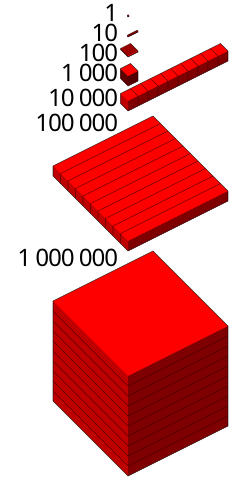మిలియను
స్వరూపం
| అంకెల జాబితా - Integers | |
|---|---|
| Cardinal | ఒక మిలియన్ |
| Ordinal | ఒక మిలియన్ వంతు |
| en:Factorization | 26 · 56 |
| en:Roman numeral | |
| Unicode representation of en:Roman numeral |
|
| Binary | 11110100001001000000 |
| en:Hexadecimal | F4240 |
Look up మిలియన్ in Wiktionary, the free dictionary.

ఒక మిలియన్ (One million) (1,000,000), లేదా వేయి 'వేయిలు' వెయ్యి, ఒక నేచురల్ సంఖ్య, 999,999 తరువాత, 1,000,001 నకు ముందు వస్తుంది.
శాస్త్రీయ విధానంలో దీనిని 106 లా వ్రాస్తారు.[1] భౌతిక కొలమానాలలో కూడా వీటిని ఉపయోగిస్తారు. ఉదా ఎస్.ఐ. పద్ధతిలో ఒక మెగావాట్ 1,000,000 వాట్ లకు సమానము.
ఈ పదానికి మూలం 'ఇటాలియన్ భాష', మిల్లీ అంటే 1,000, 1,000,000 మిలియన్ అయింది. పెద్ద వేయి (a large thousand).
ఇవి చూడండి
[మార్చు]- ఆర్డర్స్ ఆఫ్ మాగ్నిట్యూడ్ (సంఖ్యలు) లను డైమెన్షన్ లెస్ సంఖ్య ల పోలికల కొరకు 1,000,000, 10,000,000 ల మధ్య, (106 and 107).
- పెద్ద అంకెల పేర్లు
7 అంకెల సంఖ్యలు (1,000,000 - 9,999,999)
[మార్చు]- 1,000,003 - 7 అంకెల అతి చిన్న ప్రధాన సంఖ్య (prime number)
- 1,046,527 - Carol number
- 1,048,576 = 220 (power of two), 2,116-gonal number, an 8,740-gonal number and a 174,764-gonal number, the number of bytes in a mebibyte, the number of kibibytes in a gibibyte, and so on. Also the most rows that Microsoft Excel (Microsoft Office 2007) can accept in a single worksheet.
- 1,048,976 - Leyland number
- 1,050,623 - Kynea number
- 1,058,576 - Leyland number
- 1,084,051 - Keith number
- 1,089,270 - harmonic divisor number
- 1,111,111 - repunit
- 1,136,689 - Pell number, Markov number
- 1,234,567 - Smarandche consecutive number (base 10 digits are in numerical order)
- 1,278,818 - Markov number
- 1,342,269 - Fibonacci number
- 1,346,269 - Markov number
- 1,421,280 - harmonic divisor number
- 1,441,440 - colossally abundant number
- 1,441,889 - Markov number
- 1,539,720 - harmonic divisor number
- 1,563,372 - Wedderburn-Etherington number
- 1,594,323 = 313
- 1,596,520 - Leyland number
- 1,647,086 - Leyland number
- 1,679,616 = 68
- 1,686,049 - Markov number
- 1,741,725 - equal to the sum of the seventh power of its digits
- 1,771,561 = 116 = 1213 = 13312, also, Commander Spock's estimate for the tribble population in the Star Trek episode "The Trouble With Tribbles"
- 1,941,760 - Leyland number
- 1,953,125 = 59
- 2,012,174 - Leyland number
- 2,012,674 - Markov number
- 2,097,152 = 221, power of two
- 2,097,593 - Leyland number
- 2,124,679 - Wolstenholme prime
- 2,178,309 - Fibonacci number
- 2,222,222 - repdigit
- 2,356,779 - Motzkin number
- 2,423,525 - Markov number
- 2,674,440 - Catalan number
- 2,744,210 - Pell number
- 2,796,203 - Wagstaff prime
- 2,922,509 - Markov number
- 3,263,442 - product of the first five terms of Sylvester's sequence
- 3,263,443 - sixth term of Sylvester's sequence
- 3,276,509 - Markov number
- 3,301,819 - alternating factorial
- 3,333,333 - repdigit
- 3,524,578 - Fibonacci number, Markov number
- 3,626,149 - Wedderburn-Etherington number
- 3,628,800 = 10!
- 4,037,913 - sum of the first ten factorials
- 4,190,207 - Carol number
- 4,194,304 = 222, power of two
- 4,194,788 - Leyland number
- 4,198,399 - Kynea number
- 4,208,945 - Leyland number
- 4,210,818 - equal to the sum of the seventh powers of its digits
- 4,213,597 - Bell number
- 4,400,489 - Markov number
- 4,444,444 - repdigit
- 4,782,969 = 314
- 4,785,713 - Leyland number
- 4,826,809 = 136
- 5,134,240 - the largest number that cannot be expressed as the sum of distinct fourth powers
- 5,555,555 - repdigit
- 5,702,887 - Fibonacci number
- 5,764,801 = 78
- 6,536,382 - Motzkin number
- 6,625,109 - Pell number, Markov number
- 6,666,666 - repdigit
- 7,453,378 - Markov number
- 7,777,777 - repdigit
- 7,861,953 - Leyland number
- 7,913,837 - Keith number
- 8,000,000 - Used to represent infinity in Japanese mythology
- 8,388,608 = 223, power of two
- 8,389,137 - Leyland number
- 8,399,329 - Markov number
- 8,436,379 - Wedderburn-Etherington number
- 8,675,309 - A hit song for Tommy Tutone (also a twin prime)
- 8,675,311 - A twin prime
- 8,888,888 - repdigit
- 8,946,176 - self-descriptive number in base 8
- 9,227,465 - Fibonacci number, Markov number
- 9,369,319 - Newman-Shanks-Williams prime
- 9,647,009 - Markov number
- 9,694,845 - Catalan number
- 9,765,625 = 510
- 9,800,817 - equal to the sum of the seventh powers of its digits
- 9,865,625 - Leyland number
- 9,926,315 - equal to the sum of the seventh powers of its digits
- 9,999,991 - Largest 7 digit prime number
- 9,999,999 - repdigit
మూలాలు
[మార్చు]- ↑ Wells, D. The Penguin Dictionary of Curious and Interesting Numbers London: Penguin Group. (1987): 185. "1,000,000 = 106"

